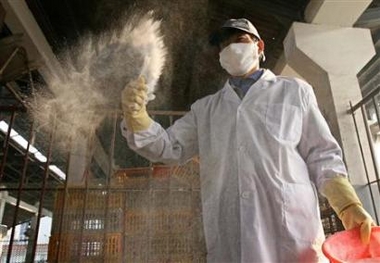|
China faces "major test" in bird flu fight
(Reuters)
Updated: 2005-11-23 19:53
China faces its "first real test" in dealing with avian flu but the financial
impact of the disease should not be too severe, an economic strategist said on
Wednesday.

A Chinese worker
disinfects a poultry market in Shanghai November 22, 2005.
[Reuters] |
Since mid-October, China has reported 20 outbreaks of the deadly H5N1 strain
of bird flu. Millions of birds have been culled, the military called in to
impose quarantine zones and a mass vaccination campaign for poultry has been
launched.
Compensation has also been paid to farmers for culled birds, underscoring the
government's desire to minimize the impact on the rural poor and encourage
cooperation.
Narrowing China's rural-urban divide is one of President Hu Jintao and
Premier Wen Jiabao's key policy objectives, and getting the support of poor
farmers is vital, said Andy Rothman, China macro strategist for brokers CLSA.
"We can best describe this as the first real test of Hu Jintao and Wen
Jiabao's policy of putting China's poor people first," Rothman told the foreign
correspondents club in Beijing.
Making sure local officials do not coerce farmers into complying with
prevention measures would be crucial to the success of curbing the disease, said
Rothman, which has already led to the culling of over 20 million birds in China
this year.
OTHER CRISES
The government should be careful, though, that it does not shift all
resources to fighting bird flu and ignore other, far more pressing health crises
in China such as AIDS and malaria, Rothman said.
H5N1 has killed 67 people in Asia since 2003, and both the World Bank and
Asian Development Bank have warned of the huge economic costs of a human
pandemic should the virus mutate into a form that can spread easily among
people.
For now, the virus is hard for humans to catch. But one person, a poultry
worker from Anhui province, is known to have died of bird flu in China. Another
confirmed case, a nine-year-old boy, survived infection while his dead sister is
a suspected case.
But Rothman said China, where poultry meat production accounts for just 3
percent of gross domestic product and a fraction of total exports, should be
spared the worst effects even if, as expected, avian flu continues to spread
among birds.
Some 50 million Chinese households raise poultry, mainly in backyards, yet
the average number of birds raised is just 19, he said, citing a Chinese
government survey.
"I believe if people stop eating chicken, they're not going to stop eating
meat. They're simply going to substitute, and most of the meat raised and
consumed in China is not poultry, it's pork," Rothman said.
|